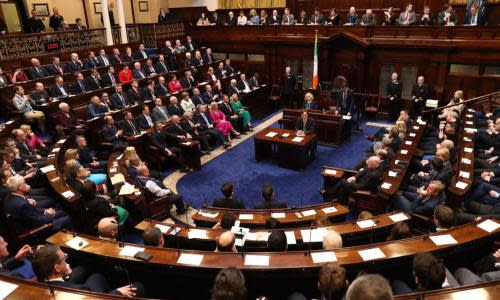Varadkar resigns as Irish government enters stalemate

Leo Varadkar has resigned as taoiseach after Ireland’s hung parliament entered deadlock over the choice of a new premier.
Varadkar submitted his resignation to Michael D Higgins, the president of Ireland, on Thursday night after a tempestuous but inconclusive sitting of Dáil Éireann, which met for the first time since the 8 February election. It adjourned until 5 March, giving party leaders three weeks to try to form a ruling coalition.
The Fine Gael leader and his administration will continue to work in their current roles until successors are appointed but will avoid major policy decisions, financial allocations and public appointments “unless absolutely necessary”, and only then after consultation with other parties.
Varadkar, the Sinn Féin leader, Mary Lou McDonald, the Fianna Fáil leader, Micheál Martin, and the Green party leader, Eamon Ryan, were nominated for taoiseach by their parties but all, as expected, fell far short of an 80-seat majority in the 160-seat chamber.
McDonald won the most votes, 45, with 84 against and 29 abstentions. Martin won 41, with 97 against and 19 abstentions. Varadkar won 36, with 107 against and 16 abstentions. Ryan won 12, with 115 against and 28 abstentions.
The 33rd dáil opened amid pomp and ceremony but the stalemate put it on ice after just a day, reflecting a deeply fragmented political landscape.
Vitriolic exchanges between party leaders after the votes underlined the challenge of forming a government, a process that could take weeks or even months, and end in another election.
Martin reiterated his opposition to working with Sinn Féin in an onslaught on the party’s links to the IRA during and since the Troubles. “When I raised the issue of the systematic cover-up of child abuse by the Provisional IRA, I was called a lowlife by deputies present here today,” he said. He also accused Sinn Féin of antisemitism and peddling a manifesto of spendthrift populism.
McDonald hit back, saying Martin shared a cabinet table with colleagues convicted of corruption and that he reflected an old, discredited duopoly that sought to ignore voters’ desire for change. “I see we still live rent-free in Micheál Martin’s narrow and bitter mind,” she said. “Fine Gael and Fianna Fáil have had the run of this place for a century, and by Christ, they’re not prepared to let go.”
McDonald said her party’s breakthrough in the election – it won 24% of the vote, more than any other party – showed a desire for an alternative government that would build affordable homes, cut rents and reduce the pension age.
Martin said he would ask Varadkar in coming days to engage in government formation talks, raising the possibility of an unprecedented coalition between Fianna Fáil and Fine Gael, centrist rivals that have dominated Irish politics for a century.
However, Fine Gael appears determined to go into opposition, saying it needs to regroup after nine years in office and a hammering from voters, raising doubts about any deal with Fianna Fail. Varadkar has also ruled out a deal with Sinn Féin.
In the election, Fianna Fáil won 38 seats, Sinn Féin won 37, Fine Gael 35 and the Greens 12, with small leftwing parties and independents sharing the rest.
Fianna Fáil’s slim advantage ended when one of its TDs (MPs), Seán Ó Fearghaíl, was re-elected as speaker, or Ceann Comhairle, whittling the party’s voting bloc down to 37.
Several left wing parties supported McDonald for taoiseach, underlining their preference for a left wing rainbow coalition. However, there is widespread acceptance that a stable government will require two of the three big parties.
Some newly elected politicians made colourful arrivals. The brothers Michael and Danny Healy-Rae, independent TDs from Kerry, played traditional music on Kildare street.

